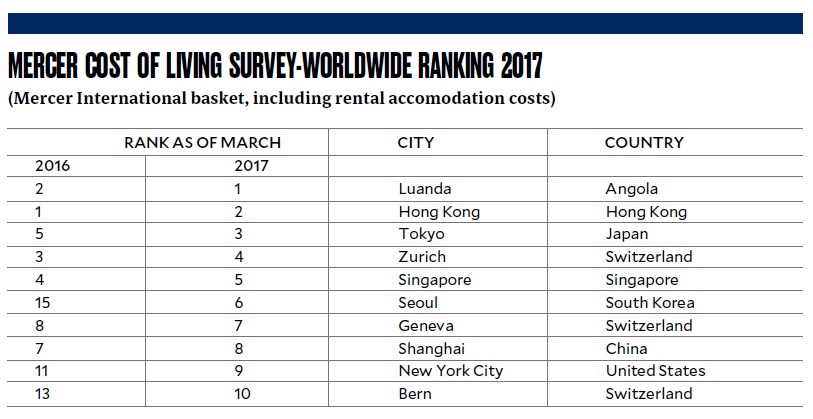To entice expats, consider the cost of goods, services
 A heads up to multinational companies, especially those with expatriates: To provide your international assignees the best experience working abroad, take into careful consideration inflation for goods and services, as well as the stability of the housing market in their host countries, to come up with the best and most competitive compensation packages.
A heads up to multinational companies, especially those with expatriates: To provide your international assignees the best experience working abroad, take into careful consideration inflation for goods and services, as well as the stability of the housing market in their host countries, to come up with the best and most competitive compensation packages.
This is the recommendation of global consulting firm Mercer, based on the findings of its recently released Cost of Living Survey 2017, an annual study which is now on its 23rd year.
Two hundred nine cities across five continents were included in the survey, which measures the comparative cost of over 200 items in each location, including housing, transportation, food, clothing, household goods, and entertainment.
“While historically, mobility, talent management, and rewards have been managed independently of one another, organizations are now using a more holistic approach to enhance their mobility strategies. Compensation is important to be competitive and must be determined appropriately based on the cost of living, currency, and location,” states Ilya Bonic, senior partner and president of Mercer’s Career business, in the survey’s report.
The survey identified five Asia Pacific cities as some of the most expensive places to work in: Hong Kong, which is at No. 2—a result of its currency pegged to the US dollar, which drove up the cost of local accommodations; Tokyo, No. 3; Singapore, No. 5; Seoul, No. 6; and Shanghai at No. 8.
Other cities on the Top 10 include Luanda, Angola; Zurich, Geneva and Bern in Switzerland; and New York City.
Luanda takes top spot because of the city’s high cost of goods and security.
Manila, while not in the Top 10, is No. 95 on the survey, falling 15 places from its 2016 ranking.
The survey uses New York as the base city against which all other cities are compared, while currency movements are measured against the US dollar.
In Asia Pacific, for example, the “majority of Chinese cities fell in the ranking due to the weakening of the Chinese yuan against the US dollar,” says Nathalie Constantin-Métral, principal at Mercer who is responsible for compiling the survey’s rankings.
On the other hand, “the strengthening of the Japanese yen along with the high costs of expatriate consumer goods and a dynamic housing market pushed Japanese cities up,” she adds.
Other Asian cities that rose up the ranks include Mumbai (from 82 to 57), Bangkok (from 74 to 67), Jakarta (from 93 to 88), and Hanoi (from 106 to 100).
In the Americas, the survey finds that US cities are the most expensive locations to work in, and have “either remained stable in the ranking or have slightly increased due to the movement of the US dollar against the majority of the currencies worldwide,” says Constantin-Métral.
Most Western European cities, however, ranked lower compared to their previous posts, again because of European currencies’ weakening against the US dollar.
As one of the world’s leading consulting firms on health, wealth and careers, Mercer designed its Cost of Living survey to help multinational companies and governments determine compensation allowances for their expatriate employees. The survey also helps companies develop better global talent strategies to support their mobile workforce’s career growth and cement their competitiveness internationally.
“Globalization of the marketplace is well-documented, with many companies operating in multiple locations around the world and promoting international assignments to enhance the experience of future managers,” says Bonic. “There are numerous personal and organizational advantages for sending employees overseas, whether on long- or short-term assignments, including career development by obtaining global experience, the creation and transfer of skills, and the reallocation of resources.”














